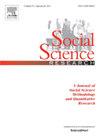衡量在COVID-19期间亲军事信息对美国公共卫生行为的独特影响
IF 3.5
2区 社会学
Q1 SOCIOLOGY
引用次数: 0
摘要
与其他高度发达国家的成年人相比,美国成年人在遵守COVID-19指南方面表现得非常糟糕。研究指出,美国人独特的党派两极化是这种失败的一个关键原因,认为政治党派之争将任何为所有美国人着想的团结意愿变成了只为我的美国人着想的意愿。然而,在美国公共卫生史上普遍使用的一个非政治框架从未得到广泛应用,也没有经过经验检验:即采取公共卫生行动“支持部队”。这篇文章通过来自600多名美国成年人的实验数据和来自1000个美国县的观察数据填补了这一空白,这些数据衡量了引发对军队支持的信息如何影响成年人的COVID-19预防行为。结果表明,虽然关于采取公共卫生行动以保护军队的重要性的信息可能对美国人在疫情早期的COVID-19做法产生了一些影响,但随着时间的推移,这种影响逐渐减弱,而政治党派关系的分裂效应也在加强。然而,有限的证据也表明,共和党社区的军事信息削弱了一些党派对公共卫生行为的控制,这表明统一的军事规范可能仍然存在。本文章由计算机程序翻译,如有差异,请以英文原文为准。
Measuring the unique effect of pro-military messaging on American public health behavior during COVID-19
American adults were uniquely bad at adhering to COVID-19 guidelines when compared to adults in other highly developed countries. Research pointed to Americans' distinctive partisan polarization as a key source of that failure, arguing that political partisanship transformed any united willingness to look out for all Americans into a willingness to only look out for my Americans. Yet, one apolitical frame commonly used throughout the United States' public health history was never widely applied nor empirically tested: that of taking public health actions to ‘support the troops.’ This article fills this gap via experimental data from more than 600 U.S. adults and observational data from 1000 U.S. counties measuring how messages that trigger support for the military may have affected adults' COVID-19 prevention behaviors. Results show that while messages about the importance of taking public health actions in order to protect the military may have had some effect on Americans' COVID-19 practices early in the pandemic, over time that effect eroded—while the divisive effects of political partisanship strengthened. Yet, limited evidence also indicates that military messages in Republican communities weakened some of partisanship's hold on public health behaviors—suggesting that a unifying military norm may still exist.
求助全文
通过发布文献求助,成功后即可免费获取论文全文。
去求助
来源期刊

Social Science Research
SOCIOLOGY-
CiteScore
4.30
自引率
4.00%
发文量
0
审稿时长
65 days
期刊介绍:
Social Science Research publishes papers devoted to quantitative social science research and methodology. The journal features articles that illustrate the use of quantitative methods in the empirical solution of substantive problems, and emphasizes those concerned with issues or methods that cut across traditional disciplinary lines. Special attention is given to methods that have been used by only one particular social science discipline, but that may have application to a broader range of areas.
 求助内容:
求助内容: 应助结果提醒方式:
应助结果提醒方式:


